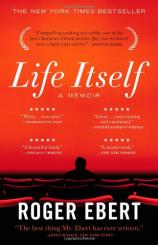Life Itself: A Memoir
Review
Life Itself: A Memoir
Roger Ebert has spent a lifetime as a critic, immersed in the world of cinema as he thoughtfully appraises the work of actors, directors and screenwriters. Now, approaching the end of his seventh decade, he has focused his critical lens on his own life in this insightful, compassionate, witty and moving self-portrait.
"There are certain books it’s a privilege to review, and LIFE ITSELF is one of that small number."
LIFE ITSELF grew out of the blog Ebert began writing in 2008, and portions, such as the glimpse of his reading life, “Books Do Furnish a Room,” will look familiar to its regular readers. Though it presents a comprehensive and, in some instances, roughly chronological account of his life, including the pleasures his work and attendant fame have brought him and the harrowing ordeal of his recent illnesses, each of the chapters works as a freestanding piece. Ebert's memory for detail is prodigious and his ability to evoke people and places compelling.
Born in 1942, Ebert “grew up in security and comfort” in Urbana, Illinois, his father an electrician for the University of Illinois and his mother employed by a finance company. Realizing only years later that “my parents never really had much money,” he recounts with obvious pleasure what amounted to something close to an idyllic post-war Middle American boyhood. There are no revelations of sexual abuse or other dark subjects, but he acknowledges his parents’ problems with alcohol, an affliction he overcame in 1979 with the help of Alcoholics Anonymous. From the day he landed his first newspaper job at age 16, it seemed his career as a journalist was preordained, not least in the way he effortlessly slipped into the job of film critic at the Chicago Sun-Times in 1967.
Though the book eventually returns to more personal subjects (including his passion for travel, his seriocomic romantic life and his lust for a 1957 Studebaker Golden Hawk), about midway through Ebert shifts his attention to the world of film. There’s an affectionate chapter on his friendship with softcore porn king Russ Meyer, with whom he co-wrote the screenplay for Beyond the Valley of the Dolls. Movie buffs will appreciate his portraits of actors like Lee Marvin, Robert Mitchum and John Wayne, although younger readers may wish for some more contemporary portraits.
Ebert himself is quick to mourn how his loss of speech has curtailed his “freedom to interview” and the lengthening list of “new stars and directors coming up now whom I will never get to know that way.” To his appraisals of directors Robert Altman, Martin Scorsese, Woody Allen, and his directorial and personal idol, Werner Herzog, he brings the well-honed eye of the critic and the enthusiasm of a fan.
With the exception of a brief jab at critic John Simon, for whom he feels “repugnance,” Ebert’s memoir is free of rancor, remarkably so for a public figure who, like any other, has had to endure his share of criticism. If anything, the book is suffused with a sense of gratitude and tinged with regret that perhaps he wasn’t able to repay fully the generosity of his mentors, Chicago legends Studs Terkel (“the greatest man I knew well”) and Mike Royko among them.
In that spirit, Ebert devotes a chapter that’s both tender and candid to his relationship with the late Gene Siskel, one that brought enduring celebrity to both and whose end when Siskel died of brain cancer in 1999 he still mourns. The intense rivalry that flashed in their often heated debates about movies was real, he confirms, but in the end he wistfully acknowledges that “no one else could possibly understand how meaningless was the hate, how deep was the love.” And on the subject of love, the portrait of his wife Chaz is one any spouse would cherish.
Despite the mushrooming medical calamity that has dominated his life beginning in 2006 (an operation for thyroid cancer followed by three failed reconstructive surgeries left him with a severe facial deformity, unable to speak or eat), Ebert understands he’s led a life many would envy. But he’s never mistaken the glamorous surface of the world he inhabits for life’s essence, and he’s eager to offer his views on religion (he’s a secular humanist), the afterlife (there is none) and politics (“’Kindness covers all of my political beliefs.”). What makes the experience of spending a few days in his company even more pleasurable is an accessible, almost conversational prose style that has helped make him such a popular critic for nearly 45 years.
There are certain books it’s a privilege to review, and LIFE ITSELF is one of that small number. Facing terrible pain, disfigurement and loss, Roger Ebert long ago could have retreated into a private, silent world. Instead, he’s still sending out small sparks of light from the inside of a darkened movie theater and now in this honest, deeply felt reminiscence. That’s a tribute to him, and a gift to all of us.
Reviewed by Harvey Freedenberg on September 20, 2011
Life Itself: A Memoir
- Publication Date: September 4, 2012
- Paperback: 448 pages
- Publisher: Grand Central Publishing
- ISBN-10: 0446584967
- ISBN-13: 9780446584968





